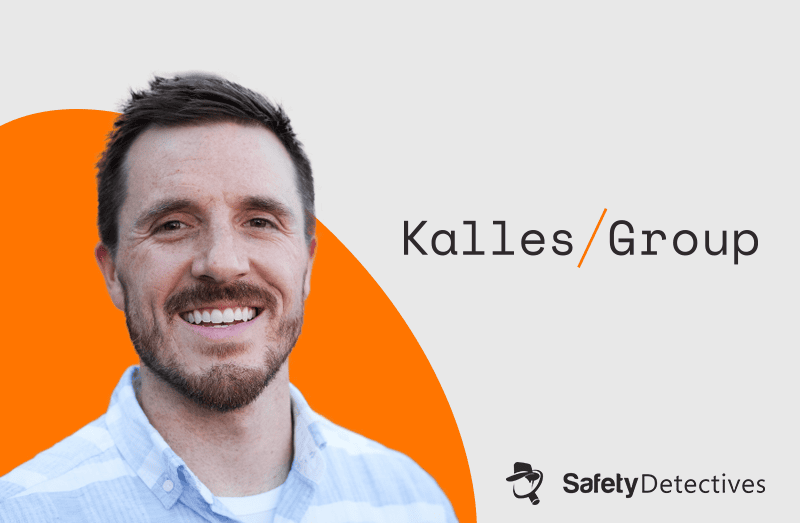The following article is from an interview with Bryon Scharenberg conducted by Roberto Polozio of Safety Detectives, and originally published under the title, “Is Your Data Safe As You Think?” on July 21, 2024.
It can be accessed in it’s original format here.
Whatever you know about cybersecurity, cybercriminals probably know that too and are already finding new ways to breach your defenses and steal your sensitive data.
How can you always stay on top of the latest threats, vulnerabilities, and emerging trends to effectively protect yourself or your business as cyber threats grow in number and sophistication?
In this new interview series by Safety Detectives, I am talking to cybersecurity experts and business leaders who share untapped insights from their experience and expertise that will help you be more aware and effective in protecting your sensitive data.
Our guest today is Bryon Scharenberg, Director of Growth at Kalles Group.
Bryon has a diverse professional background ranging from go-to-market leadership, launching global programs, business development, management consulting, technical recruiting, and nonprofit missions work. In his current role as Director of Growth at Kalles Group, he oversees various key areas including recruiting, marketing, compliance, security, and engineering projects.
Previously, Bryon co-founded the Global Leadership Forum and held positions at Cru, where he developed partnerships and led initiatives for global impact. Bryon’s educational background includes a Bachelor of Science in Business Administration and Management from Montana State University-Bozeman. His educational background also includes Executive education at Saïd Business School, University of Oxford, with a focus on Disruptive Strategy in Digital Marketing.
Let’s pick his brain.
To start, can you share the story of what inspired you to pursue your professional path?
My journey into cybersecurity began in a very non-traditional way. I spent the first decade of my professional career as a missionary with a global, faith-based nonprofit—not a common career path you hear of at cybersecurity networking events. However, I entered the space because I’ve always had a fascination with technology, and professionally, I’ve become an expert in building relationships and solving problems for people and teams.
The natural pathway for me into security started with hiring and recruiting. This became a seamless opportunity for me to accelerate a career in this direction because the security field has a direct connection with something I care deeply about: how trust and security directly affect people’s lives for good. This natural connection made cybersecurity an obvious place for me to thrive professionally.
What was a pivotal moment in your life/career that shaped your views on cybersecurity and privacy?
A pivotal moment for me was living abroad in India and trying to make a payment from my home bank in the US to another account in India. This experience highlighted the necessity of seamless technology for such interactions while balancing the complexities of privacy, fraud, risk, and security. Experiencing firsthand the challenges businesses face in this area helped me understand how critical it is to align business outcomes with customer experience.
What are the most overlooked cybersecurity and online privacy threats that you see affecting end users? Why are these threats particularly concerning?
One of the most overlooked threats is the inherent trust we place in our modern technology infrastructure due to well-executed security and privacy measures. The downside is that people often adopt half-baked, non-compliant, or insecure solutions, assuming every vendor or startup applies the same rigor as established technologies. We need to develop a measured approach to assessing new products and applications before becoming full adopters.
What common cybersecurity beliefs and practices do you passionately disagree with? Why?
I disagree with the belief that the primary value of a proper cybersecurity program is merely to prevent bad things from happening to an organization. While this is a key indicator of success, I firmly believe that security and risk management, when done right, can enable businesses to achieve their overall objectives. In other words, security is not just a door that keeps bad things out, but a key that can unlock new opportunities for a successful future.
What cybersecurity practices and tools do you personally use to ensure your online privacy and security?
I use a combination of MFA, password managers, and regular system updates to ensure my online security. I also regularly go through security training and listen to the input of much smarter people than me.
It would be foolish of me to think that I am immune to the attempts of smarter, more sophisticated people than myself, so I need to remain humble and continue to learn in order to overcome my gaps in understanding. Additionally, I’m cautious about the information I share online and regularly review privacy settings on social media and other platforms.
What cybersecurity technologies or trends do you believe will have the biggest impact on your industry in the next 5-10 years? How can they affect people if they don’t adapt?
Threats will continue to be driven by human ingenuity (albeit, ingenuity for ill intent) but will be escalated by the speed and volume by which it becomes possible with AI and machine learning-assisted tactics. The ability to process, analyze, and act upon vast amounts of data, or generate complex queries, etc., will become amplified over the coming years. As these threat tactics advance, our ability to process and monitor them must also keep pace.

